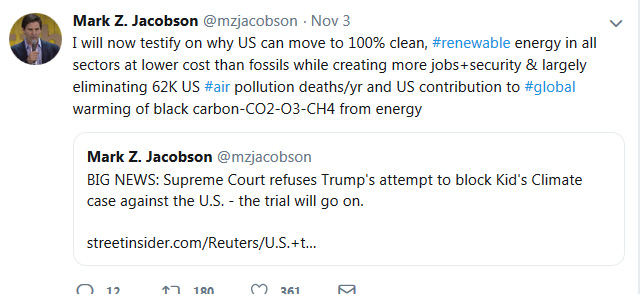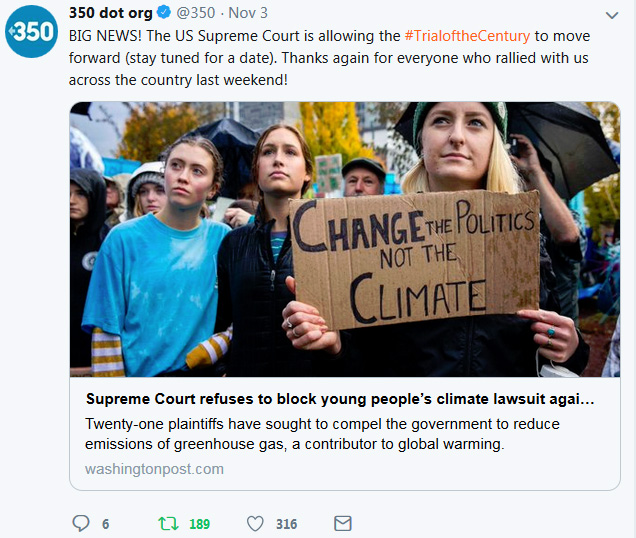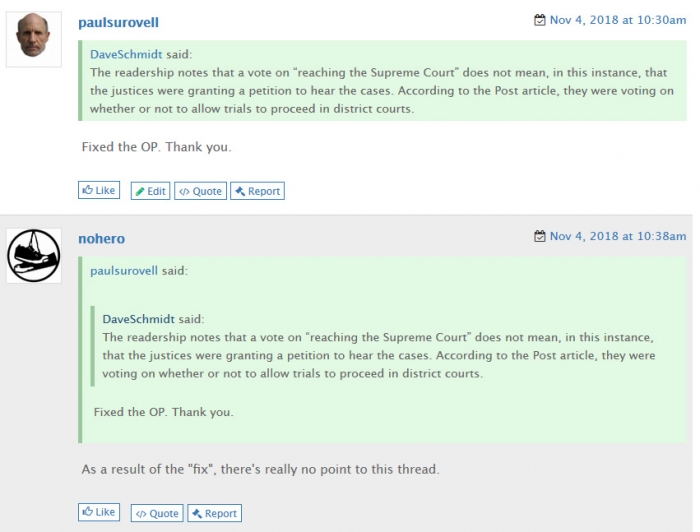Who voted with the liberals -- Kavanaugh or Roberts?
It's not a glitch. We don't actually know how any of the judges voted, since the votes are not required to be published.
Not sure what the issue is.
5 to 1 says it was Roberts though.
drummerboy said:
It's not a glitch. We don't actually know how any of the judges voted, since the votes are not required to be published.
Not sure what the issue is.
5 to 1 says it was Roberts though.
I agree with Mr. drummerboy, there's not enough information to draw a conclusion, especially since these are not decisions on the merits.
The readership notes that a vote on “reaching the Supreme Court” does not mean, in this instance, that the justices were granting a petition to hear the cases. According to the Post article, they were voting on whether or not to allow trials to proceed in district courts.
DaveSchmidt said:
The readership notes that a vote on “reaching the Supreme Court” does not mean, in this instance, that the justices were granting a petition to hear the cases. According to the Post article, they were voting on whether or not to allow trials to proceed in district courts.
Fixed the OP. Thank you.
paulsurovell said:
DaveSchmidt said:Fixed the OP. Thank you.
The readership notes that a vote on “reaching the Supreme Court” does not mean, in this instance, that the justices were granting a petition to hear the cases. According to the Post article, they were voting on whether or not to allow trials to proceed in district courts.
As a result of the "fix", there's really no point to this thread.
nohero said:
paulsurovell said:As a result of the "fix", there's really no point to this thread.
DaveSchmidt said:Fixed the OP. Thank you.
The readership notes that a vote on “reaching the Supreme Court” does not mean, in this instance, that the justices were granting a petition to hear the cases. According to the Post article, they were voting on whether or not to allow trials to proceed in district courts.
Which means there's no point to this comment.
Sometimes "Liberal v. Conservative" does not work with legal technicalities.
LOST said:
Sometimes "Liberal v. Conservative" does not work with legal technicalities.
I think the vote is significant given the expectation that with Kavanaugh's confirmation the Supreme Court was going to be a rubber stamp for the Trump administration. Although many commentators opined that Roberts might step into the role of swing vote.
paulsurovell said:
I think the vote is significant given the expectation that with Kavanaugh's confirmation the Supreme Court was going to be a rubber stamp for the Trump administration. Although many commentators opined that Roberts might step into the role of swing vote.
I think it’s fairer to say the rubber-stamp expectation applied to major decisions, not every single action by the court, which would be a little on the nose.
DaveSchmidt said:
paulsurovell said:I think it’s fairer to say the rubber-stamp expectation applied to major decisions, not every single action by the court, which would be a little on the nose.
I think the vote is significant given the expectation that with Kavanaugh's confirmation the Supreme Court was going to be a rubber stamp for the Trump administration. Although many commentators opined that Roberts might step into the role of swing vote.
It's even fairer to say that the Trump administration doesn't want those cases to go to trial.
paulsurovell said:
It's even fairer to say that the Trump administration doesn't want those cases to go to trial.
The Trump administration doesn’t want cases to go to trial that it is arguing shouldn’t go to trial. Yep, I’d say it’s hard to make a fairer statement than that.
I saw very little responsible journalism indicating that the court would be a rubber stamp for the administration. I did see, and agree with, a lot of analysis indicating that the court would be much more reliably conservative, both on social issues and supportive of business interests.
max_weisenfeld said:
I saw very little responsible journalism indicating that the court would be a rubber stamp for the administration. I did see, and agree with, a lot of analysis indicating that the court would be much more reliably conservative, both on social issues and supportive of business interests.
The only coverage I saw regarding Trump and future decisions were on issues of executive privilege/authority, where it was felt that Kavanaugh will tilt the court towards more deference to the executive.
I'm not fully understand what Paul's getting at here -- it reads to me as if he's asking if Roberts or Kavanaugh will be the new median justice, and if we can expect that judge to be a true swing vote, or if he will consistently deliver outcomes that favor Republicans.
If that is his question, he might find this article from Fivethirtyeight interesting. Some relevant excerpts:
Chief Justice John Roberts, a George W. Bush appointee, will almost certainly become the new median justice, defining the court’s new ideological center. As measured by Judicial Common Space scores — which use the popular Martin-Quinn method for justices, based solely on their actual votes — the center of the court will be about as conservative as it was when Justice Sandra Day O’Connor, a Ronald Reagan appointee, was the median justice in the 1990s and early 2000s. According to these scores, the court’s center will now cross from mildly liberal to solidly conservative.
...
Roberts isn’t much of a moderate either, and by any quantitative measure, he’ll certainly be more conservative than Kennedy was. As the new “swing justice,” Roberts appears unlikely to swing very often — he has cast only fiveliberal swing votes since taking his seat on the court in 2005.
But the new median-chief, it should be noted, is deeply concerned with the legitimacy of his Supreme Court — a legitimacy that could be at risk in the wake of the acutely partisan, at times angry, Kavanaugh confirmation process. (His nomination was surrounded by midterm implications and protest and was capped by a last-minute FBI investigation into accusations of sexual assault.) It is Roberts’s deep concern for the court’s reputation and standing that has often been cited to explain his majority opinion that saved Obamacare, for example
PVW said:
I'm not fully understand what Paul's getting at here -- it reads to me as if he's asking if Roberts or Kavanaugh will be the new median justice, and if we can expect that judge to be a true swing vote, or if he will consistently deliver outcomes that favor Republicans.
I think we’re simply supposed to be chastened by the fact that the Trump administration won’t get at least a 5-4 majority in support of every argument it makes.
DaveSchmidt said:
PVW said:I think we’re simply supposed to be chastened by the fact that the Trump administration won’t get at least a 5-4 majority in support of every argument it makes.
I'm not fully understand what Paul's getting at here -- it reads to me as if he's asking if Roberts or Kavanaugh will be the new median justice, and if we can expect that judge to be a true swing vote, or if he will consistently deliver outcomes that favor Republicans.
Not "chastened," just expressing hope that this sliver of light could be a sign that Roberts is going to do a Souter. A hope, not a prediction.
I became aware of the decision through these two tweets which remind us of the connection between public activism and the courts.
Mark Jacobson is a leader (perhaps the leader) of the movement for 100% electrification of the economy (powered by clean energy) by the year 2050. If the media does its job there will be headlines and follow-ups on his testimony. That is also a hope, not a prediction.
paulsurovell said:I became aware of the decision through these two tweets which remind us of the connection between public activism and the courts.
I'm glad more people are realizing the connection between public activism and the courts. It's something more people should have kept in mind when there was an election to decide who would have the power to nominate judges to the Federal courts through 2020.
paulsurovell said:Not "chastened," just expressing hope that this sliver of light could be a sign that Roberts is going to do a Souter. A hope, not a prediction.
At this point, the only "sign" would be that Roberts is being Roberts.
The climate change lawsuit is Juliana v. United States. The “decision” was the denial of a stay by the Supreme Court. Mainly, it was based on the status of the case; the Supreme Court said that a lower court should deal with the government’s arguments first. That’s all. It’s not on the merits.
In the census case, the Supreme Court didn’t grant a stay, which request had been denied below. The decision of the trial court sets out the basic reasons why there wouldn’t be a stay, and that the trial would go forward.
I say it's "Roberts being Roberts" because he's applying a recognized principle, not to make a decision on the merits when there's some other reason the Supreme Court doesn't have to act at that time.
nohero said:
paulsurovell said:Not "chastened," just expressing hope that this sliver of light could be a sign that Roberts is going to do a Souter. A hope, not a prediction.At this point, the only "sign" would be that Roberts is being Roberts.
The climate change lawsuit is Juliana v. United States. The “decision” was the denial of a stay by the Supreme Court. Mainly, it was based on the status of the case; the Supreme Court said that a lower court should deal with the government’s arguments first. That’s all. It’s not on the merits.
In the census case, the Supreme Court didn’t grant a stay, which request had been denied below. The decision of the trial court sets out the basic reasons why there wouldn’t be a stay, and that the trial would go forward.
I say it's "Roberts being Roberts" because he's applying a recognized principle, not to make a decision on the merits when there's some other reason the Supreme Court doesn't have to act at that time.
So you're retracting your earlier comment. Good.
Teacher says: Every time a bell rings, an adversary of paulsurovell retracts a comment.
I'd also put my money on Roberts. Can't think of another SCOTUS con with any care about the Court's reputation. Not that the guy's gonna go full-Souter on us, but he seems to be invested in the Court's cred.
DaveSchmidt said:
Teacher says: Every time a bell rings, an adversary of paulsurovell retracts a comment.
That has a nice ring to it, but you're being far too kind.
Edited to Add: And does saying "this thread has no point" make someone an "adversary?"
paulsurovell said:
nohero said:So you're retracting your earlier comment. Good.
paulsurovell said:Not "chastened," just expressing hope that this sliver of light could be a sign that Roberts is going to do a Souter. A hope, not a prediction.At this point, the only "sign" would be that Roberts is being Roberts.
The climate change lawsuit is Juliana v. United States. The “decision” was the denial of a stay by the Supreme Court. Mainly, it was based on the status of the case; the Supreme Court said that a lower court should deal with the government’s arguments first. That’s all. It’s not on the merits.
In the census case, the Supreme Court didn’t grant a stay, which request had been denied below. The decision of the trial court sets out the basic reasons why there wouldn’t be a stay, and that the trial would go forward.
I say it's "Roberts being Roberts" because he's applying a recognized principle, not to make a decision on the merits when there's some other reason the Supreme Court doesn't have to act at that time.
Not really. "Roberts being Roberts" on a procedural issue isn't news. It's like starting a thread, "The Sun Came Up Today - Technical Glitch or Precursor of Things to Come"?
paulsurovell said:
Edited to Add: And does saying "this thread has no point" make someone an "adversary?"
My mistake again. I thought “adversary” was a higher order of cherubim.
I need to find a better dictionary.
paulsurovell said:
LOST said:I think the vote is significant given the expectation that with Kavanaugh's confirmation the Supreme Court was going to be a rubber stamp for the Trump administration. Although many commentators opined that Roberts might step into the role of swing vote.
Sometimes "Liberal v. Conservative" does not work with legal technicalities.
Kavanaugh and Roberts will be there long after Trump is gone. And they know it.
Sponsored Business
Promote your business here - Businesses get highlighted throughout the site and you can add a deal.






















On Friday, the Supreme Court voted against Trump administration attempts to block two lawsuits from going to trial: one claims a Constitutional protection for young people against Climate Change, the other opposes a question about citizenship in the Census.
Gorsuch, Alito and Thomas have announced they supported the administration in one or the other votes. That means at least one of the remaining conservative justices -- Roberts or Kavanaugh -- must have voted with the 4 liberals to reach a majority of 5 (assumes all liberals voted against the administration).
Thus far none of the other six have announced how they voted.
Was this a technical glitch that will be reversed before the cases go to trial? Or is it a precursor of things to come?
Edited to Add: Replaced "going to Supreme Court" with "going to trial."
https://www.washingtonpost.com/politics/courts_law/supreme-court-allows-trial-on-census-citizenship-question-to-go-forward/2018/11/02/48fed12e-ddfa-11e8-b3f0-62607289efee_story.html?utm_term=.cfa8fe938189